-
CATEGORY ::
- All Seeds /
- All Flower Seeds /
- All Cornflower Seeds





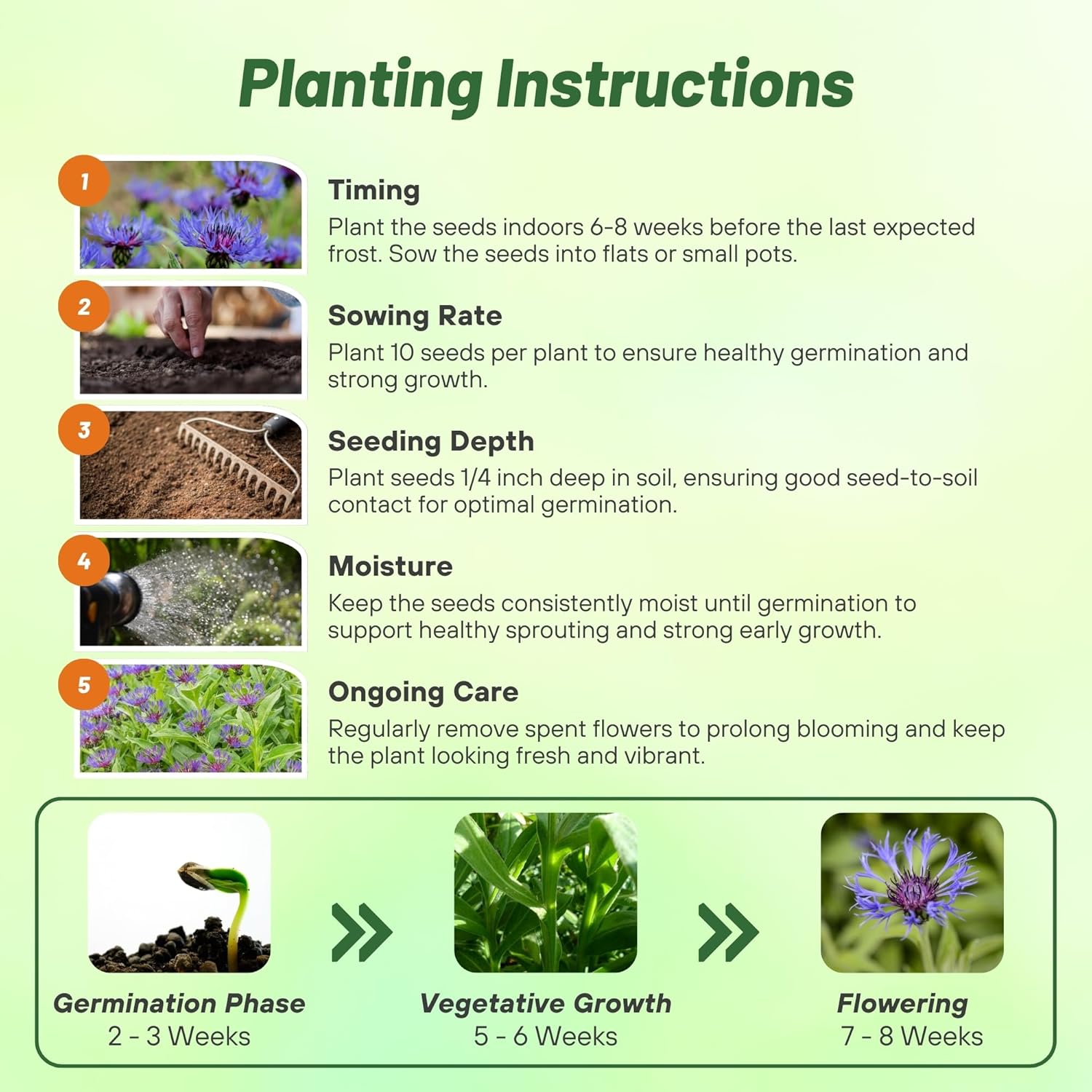


Cornflower Seeds - Montana
SEASON
Perennial
USDA ZONES
3 - 8
HEIGHT
12 - 24 inches
BLOOM SEASON
Late spring to mid summer
BLOOM COLOR
Blue
ENVIRONMENT
Full sun
SOIL TYPE
Clay, sandy, normal loam
DEER RESISTANT
Yes
HOUSE PLANT
No
SEEDS PER POUND
99,790
SEASON
Annual
USDA ZONES
3 - 10
HEIGHT
16 - 24 inches
BLOOM SEASON
Mid-summer and fall
BLOOM COLOR
Blue
ENVIRONMENT
Full sun
SOIL TYPE
Well-drained, pH 6.6 - 7.8
DEER RESISTANT
Yes
HOUSE PLANT
No
SEASON
Annual
USDA ZONES
3 - 10
HEIGHT
12 - 18 inches
BLOOM SEASON
Summer and fall
BLOOM COLOR
Blue
ENVIRONMENT
Full sun to partial shade
SOIL TYPE
Well-drained, pH 6.6 - 7.8
DEER RESISTANT
Yes
HOUSE PLANT
No
SEASON
Annual
USDA ZONES
3 - 10
HEIGHT
12 - 18 inches
BLOOM SEASON
Summer and fall
BLOOM COLOR
Pink
ENVIRONMENT
Full sun to partial shade
SOIL TYPE
Well-drained, pH 6.6 - 7.8
DEER RESISTANT
Yes
HOUSE PLANT
No
SEASON
Annual
USDA ZONES
3 - 10
HEIGHT
12 - 18 inches
BLOOM SEASON
Summer and fall
BLOOM COLOR
Red
ENVIRONMENT
Full sun to partial shade
SOIL TYPE
Well-drained, pH 6.6 - 7.8
DEER RESISTANT
Yes
HOUSE PLANT
No
SEASON
Annual
USDA ZONES
3 - 10
HEIGHT
12 - 18 inches
BLOOM SEASON
Summer and fall
BLOOM COLOR
White
ENVIRONMENT
Full sun to partial shade
SOIL TYPE
Well-drained, pH 6.6 - 7.8
DEER RESISTANT
Yes
HOUSE PLANT
No
SEASON
Annual
USDA ZONES
3 - 10
HEIGHT
24 - 30 inches
BLOOM SEASON
Late spring to early fall
BLOOM COLOR
Mix
ENVIRONMENT
Full sun to partial shade
SOIL TYPE
Well-drained, pH 6.6 - 7.8
DEER RESISTANT
Yes
HOUSE PLANT
No
SEASON
Annual
USDA ZONES
3 - 10
HEIGHT
32 inches
BLOOM SEASON
Late spring to early fall
BLOOM COLOR
Black
ENVIRONMENT
Full sun to partial shade
SOIL TYPE
Well-drained, pH 6.6 - 7.8
DEER RESISTANT
Yes
HOUSE PLANT
No
About...
(Centaurea Montana) - For a true blue flower, start these seeds, and enjoy not only the blue shade, but a perennial wildflower.MORE CORNFLOWER OPTIONS
Planting Directions
TEMPERATURE
68F
AVERAGE GERM TIME
14 - 28 days
LIGHT REQUIRED
Yes
DEPTH
1/4 inch
SOWING RATE
10 seeds per plant
MOISTURE
Keep seeds moist until germination
PLANT SPACING
12 inches





Cornflower (Centaurea Montana) - For a true blue flower, start these seeds, and enjoy not only the blue shade, but a perennial wildflower as well! Native to damp meadows in the European mountain ranges, this perennial Centaurea is commonly called Mountain Bluet or Mountain Cornflower, and it is rugged and hardy, growing in most soil types and climates. The vigorous clump-forming plant has silvery-green foliage and stems that are slightly hairy. The blooms are large, solitary, and fringed and are excellent for cutting. The plant does best in moisture retentive soils. Care includes removing spent flowers after blooming. The cornflower plants can be trimmed back hard after blooming. Mountain Centaurea is known for self-sowing, so deadheading is needed if spreading is not desired.
Planting Directions
TEMPERATURE
60 - 70F
AVERAGE GERM TIME
7 - 14 days
LIGHT REQUIRED
No
DEPTH
1/4 inch
SOWING RATE
4 ounces per 1,000 square feet or 10 pounds per acre
MOISTURE
Keep seeds moist until germination
PLANT SPACING
6 - 12 inches





Cornflower (Centaurea Cyanus) - Well known and popular for being the truest blue flower, drought tolerant Cornflowers are a typical annual: they germinate easily from seeds, the plants grow quickly, and they bloom heavily. In the United State they are commonly called Bachelor's Button and are found growing in the wild. Originally, Centaurea Cyanus came from Europe where they were found growing in corn and grain fields. Cornflowers make a great addition to the wild flower garden or flower border as they attract butterflies and beneficial insects. Even in natural settings, deer will often resist the these plants.
Common Questions
Where should I plant cornflower?
Enhance your ornamental vegetable garden by incorporating the versatile cornflower. Its nectar content attracts pollinators, benefiting the yield of tomatoes, squash, and other dependent plants. In a wildflower garden, plant cornflower to attract bees and butterflies. Alternatively, in a cutting garden, pair blue cornflower with annuals such as orange cosmos or yellow marigolds. Grow cornflower alongside robust perennials like rudbeckia or coneflower to provide natural support for its stems.
Do I need to deadhead my cornflowers?
You can increase our bloom season if you deadhead your flowers. Deadheading however is not necessary.
How can I encourage more blooms?
Cornflowers thrive in bright and sunny environments, so it's crucial to plant them in a sunny location. If your cornflowers aren't blooming because of inadequate light, your best option is to plan ahead for the following year and sow them in a sunnier area.
How Long Does Cornflower Bloom?
Cornflowers usually flower for approximately 10 weeks, from May to mid-July. Extending the bloom time can be achieved by seeding the flower every two weeks on a staggered schedule.
Can I grow my cornflower in containers?
Yes, when cultivating cornflowers in pots or containers, it's important to maintain slightly dry soil to replicate pasture environments. Opt for porous clay or terracotta pots for best results. Select well-draining soil with perlite, or opt for a soilless mix composed of organic materials (similar to cactus potting soil). Regularly remove faded blooms from your potted cornflowers to keep them looking neat. Expect a brief flowering period when grown in this manner. Shorter varieties work best in containers.
Planting Directions
TEMPERATURE
65F
AVERAGE GERM TIME
14 - 21 days
LIGHT REQUIRED
No
DEPTH
1/4 inch
SOWING RATE
10 - 12 seeds per plant or 6 seeds per foot
MOISTURE
Keep seeds moist until germination
PLANT SPACING
6 - 12 inches

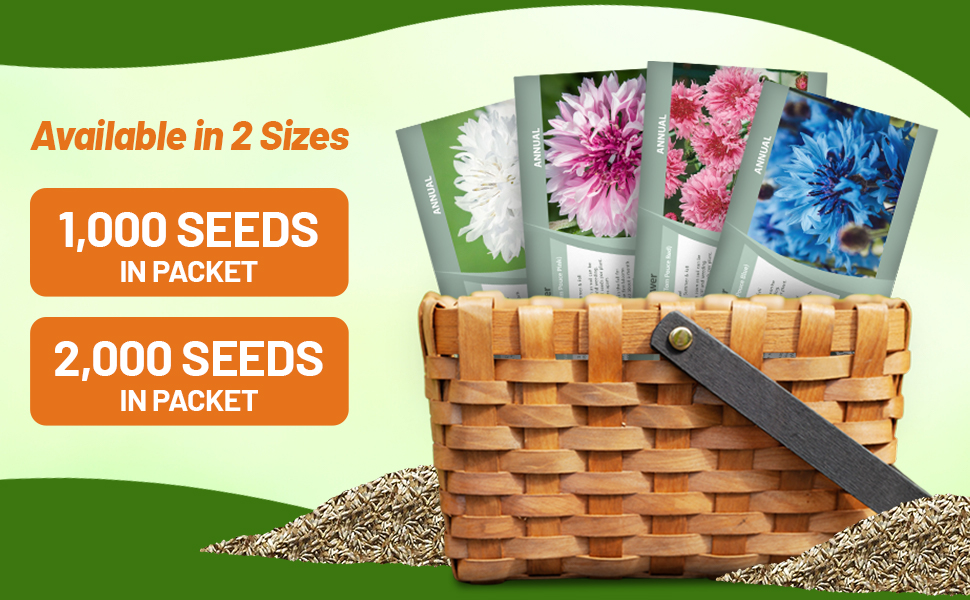
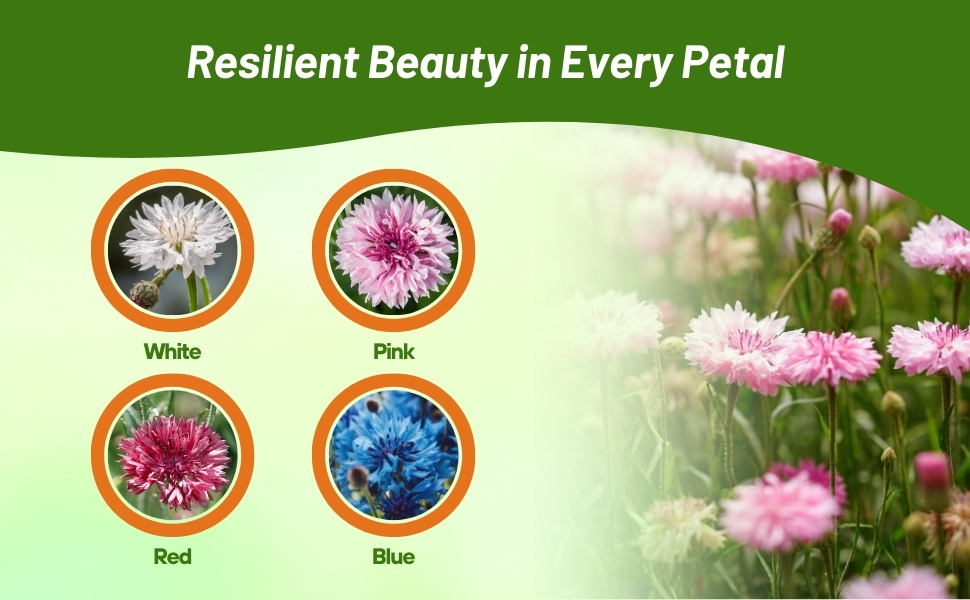
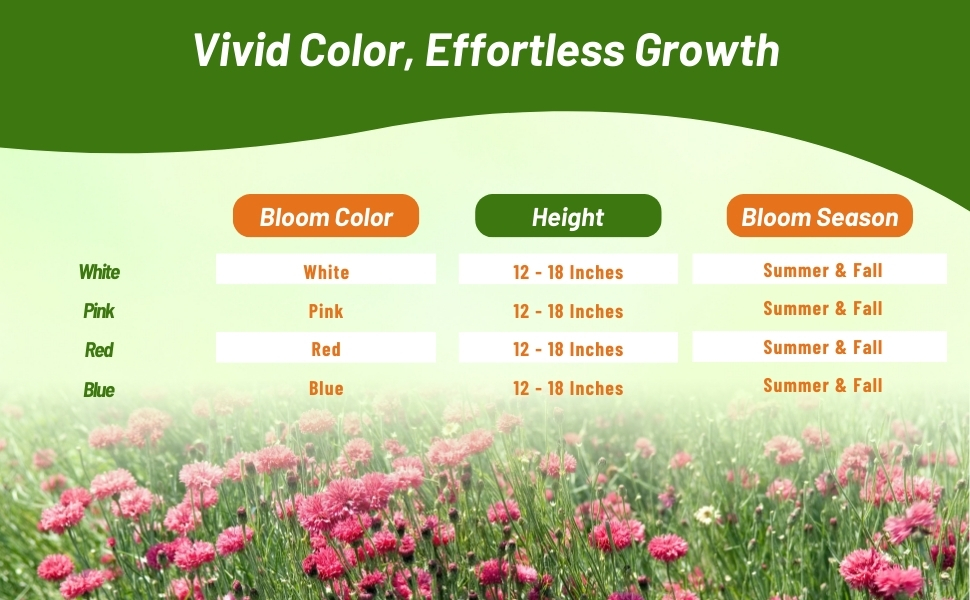

Cornflower (Centaurea Cyanus Dwarf Tom Pouce Blue) - Also known as Bachelor's Button, these well-known drought tolerant annuals make great cut flowers for fresh or dried arrangements. Grow them easily from seeds, and display these sky-blue flowers in the flower border or garden. The dwarf variety makes the perfect size for containers too. Remove spent flowers to extend the bloom season and to increase the flower size.
Centaurea Cyanus plants prefer full sun in mild climates and partial shade in the hottest regions. They tolerate a wide variety of soils as long as it drains well. Cornflowers perform the best in mild climates with moderate water, but they can withstand drought. Bachelor's Button flowers are very attractive to both bees and butterflies, but deer leave the plants alone.
Directly sow seeds outdoors in early spring as soon as soil can be worked. Prepare seedbed by loosening soil and weeding. Sow the flower seeds in rows, 6 seeds per foot. Thin seedlings to 6 - 12 inches apart. In mild winter climates, seed can be sown in the fall for very early blooms the following spring. Cornflower can re-seed to bring you beautiful new plants.
Common Questions
Where should I plant cornflower?
Enhance your ornamental vegetable garden by incorporating the versatile cornflower. Its nectar content attracts pollinators, benefiting the yield of tomatoes, squash, and other dependent plants. In a wildflower garden, plant cornflower to attract bees and butterflies. Alternatively, in a cutting garden, pair blue cornflower with annuals such as orange cosmos or yellow marigolds. Grow cornflower alongside robust perennials like rudbeckia or coneflower to provide natural support for its stems.
Do I need to deadhead my cornflowers?
You can increase our bloom season if you deadhead your flowers. Deadheading however is not necessary.
How can I encourage more blooms?
Cornflowers thrive in bright and sunny environments, so it's crucial to plant them in a sunny location. If your cornflowers aren't blooming because of inadequate light, your best option is to plan ahead for the following year and sow them in a sunnier area.
How Long Does Cornflower Bloom?
Cornflowers usually flower for approximately 10 weeks, from May to mid-July. Extending the bloom time can be achieved by seeding the flower every two weeks on a staggered schedule.
Can I grow my cornflower in containers?
Yes, when cultivating cornflowers in pots or containers, it's important to maintain slightly dry soil to replicate pasture environments. Opt for porous clay or terracotta pots for best results. Select well-draining soil with perlite, or opt for a soilless mix composed of organic materials (similar to cactus potting soil). Regularly remove faded blooms from your potted cornflowers to keep them looking neat. Expect a brief flowering period when grown in this manner. Shorter varieties work best in containers.
Planting Directions
TEMPERATURE
65F
AVERAGE GERM TIME
14 - 21 days
LIGHT REQUIRED
No
DEPTH
1/4 inch
SOWING RATE
10 - 12 seeds per plant or 6 seeds per foot
MOISTURE
Keep seeds moist until germination
PLANT SPACING
6 - 12 inches





Cornflower (Centaurea Cyanus Dwarf Tom Pouce Pink) - Every cutting garden needs to have this pink Cornflower growing in it! Readily establish Cornflowers from flower seeds, and plant in masses for a spectacular display of color. This dwarf variety only reaches 12 - 18 inches tall, and is a great height for borders and beds. Cornflowers make excellent cut flowers. The blooms last in the vase well, and they also dry nicely for everlasting arrangements. Known also as pink Bachelor's Button, these annuals are well-known and grow naturally across much of the United States.
Common Questions
Where should I plant cornflower?
Enhance your ornamental vegetable garden by incorporating the versatile cornflower. Its nectar content attracts pollinators, benefiting the yield of tomatoes, squash, and other dependent plants. In a wildflower garden, plant cornflower to attract bees and butterflies. Alternatively, in a cutting garden, pair blue cornflower with annuals such as orange cosmos or yellow marigolds. Grow cornflower alongside robust perennials like rudbeckia or coneflower to provide natural support for its stems.
Do I need to deadhead my cornflowers?
You can increase our bloom season if you deadhead your flowers. Deadheading however is not necessary.
How can I encourage more blooms?
Cornflowers thrive in bright and sunny environments, so it's crucial to plant them in a sunny location. If your cornflowers aren't blooming because of inadequate light, your best option is to plan ahead for the following year and sow them in a sunnier area.
How Long Does Cornflower Bloom?
Cornflowers usually flower for approximately 10 weeks, from May to mid-July. Extending the bloom time can be achieved by seeding the flower every two weeks on a staggered schedule.
Can I grow my cornflower in containers?
Yes, when cultivating cornflowers in pots or containers, it's important to maintain slightly dry soil to replicate pasture environments. Opt for porous clay or terracotta pots for best results. Select well-draining soil with perlite, or opt for a soilless mix composed of organic materials (similar to cactus potting soil). Regularly remove faded blooms from your potted cornflowers to keep them looking neat. Expect a brief flowering period when grown in this manner. Shorter varieties work best in containers.
Planting Directions
TEMPERATURE
65F
AVERAGE GERM TIME
14 - 28 days
LIGHT REQUIRED
No
DEPTH
1/4 inch
SOWING RATE
10 - 12 seeds per plant or 6 seeds per foot
MOISTURE
Keep seeds moist until germination
PLANT SPACING
6 - 12 inches

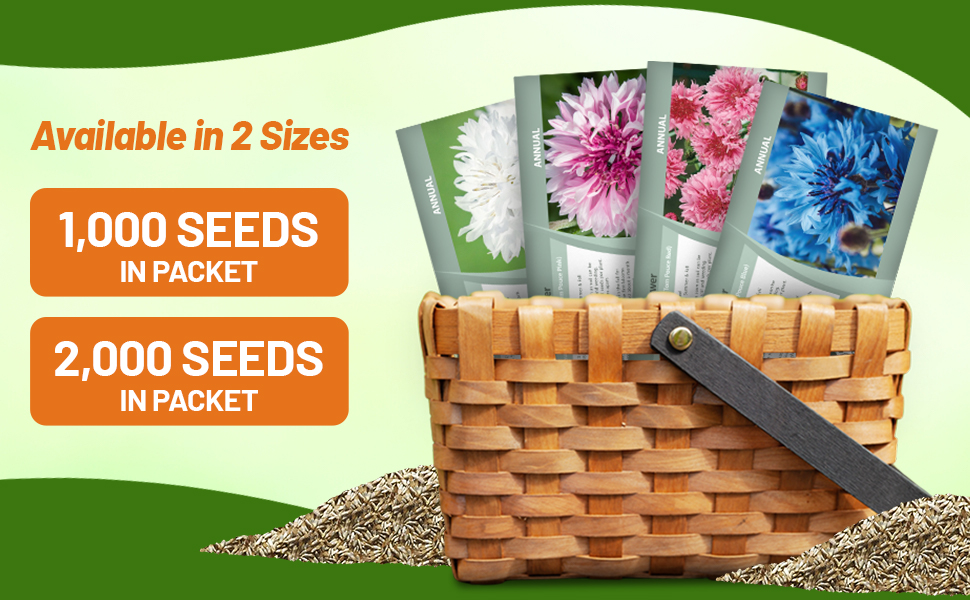
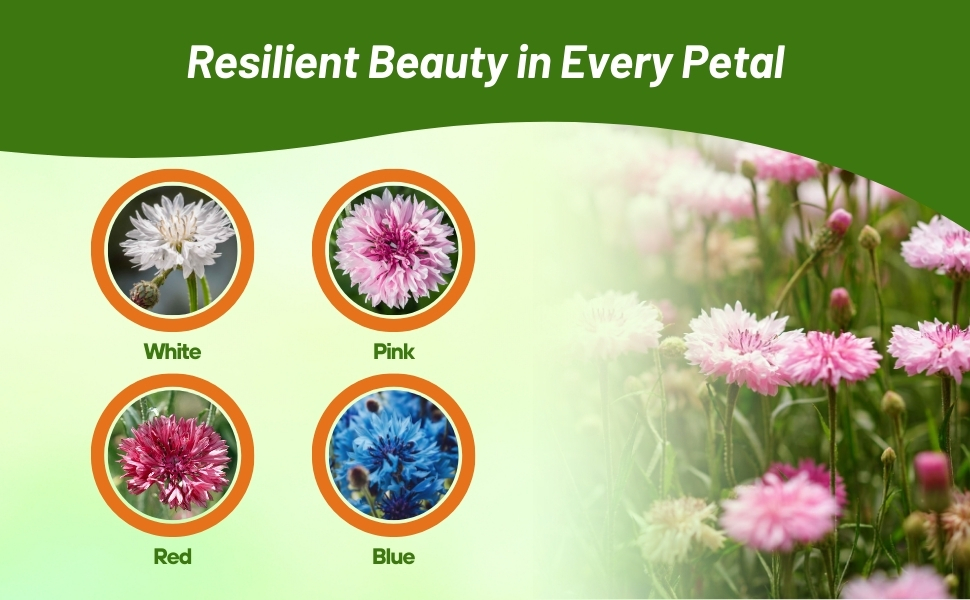
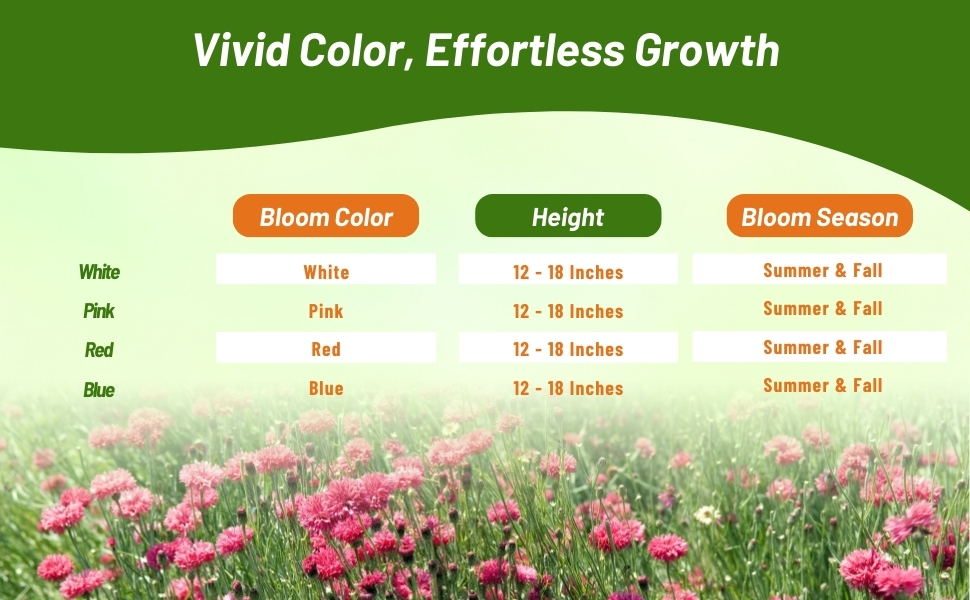

Cornflower (Centaurea Cyanus Dwarf Tom Pouce Red) - Start some Bachelor's Button seeds and add a touch of drama to the flower border with this dwarf, red variety! What a lovely sight especially when planted in mass. Cornflowers got their name in Europe where they often are found growing in different farm crops. Here in the United States, they grow naturally in the wild as well, and we often call them Bachelor's Button.
Planting Directions
TEMPERATURE
65F
AVERAGE GERM TIME
14 - 28 days
LIGHT REQUIRED
No
DEPTH
1/4 inch
SOWING RATE
10 -12 seeds per plant or 6 seeds per foot
MOISTURE
Keep seeds moist until germination
PLANT SPACING
6 - 12 inches

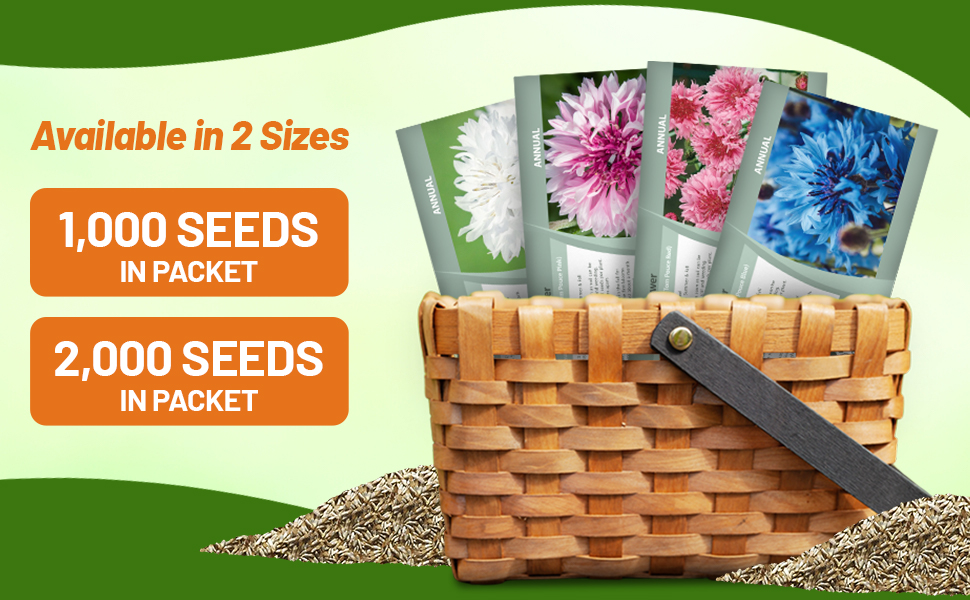
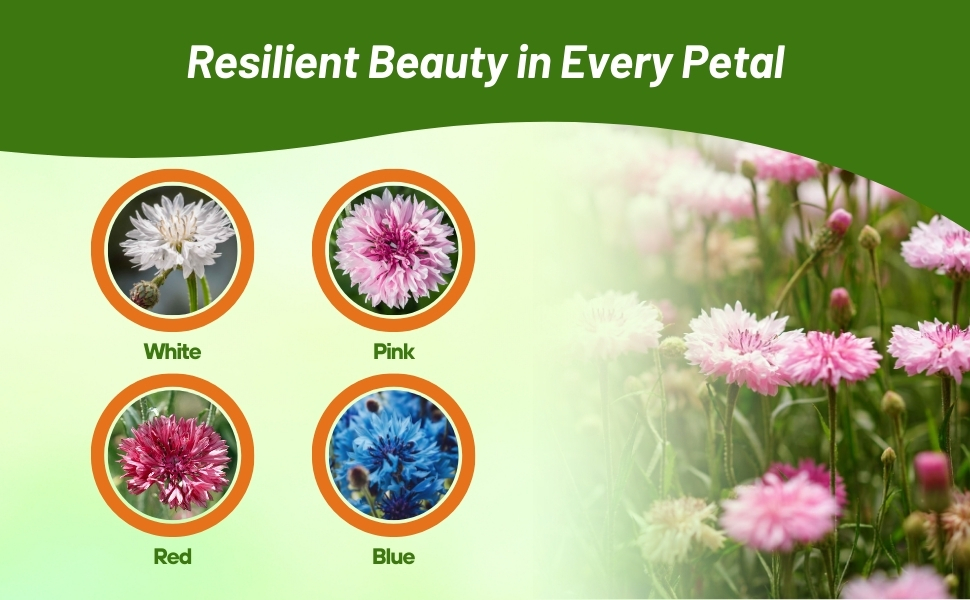
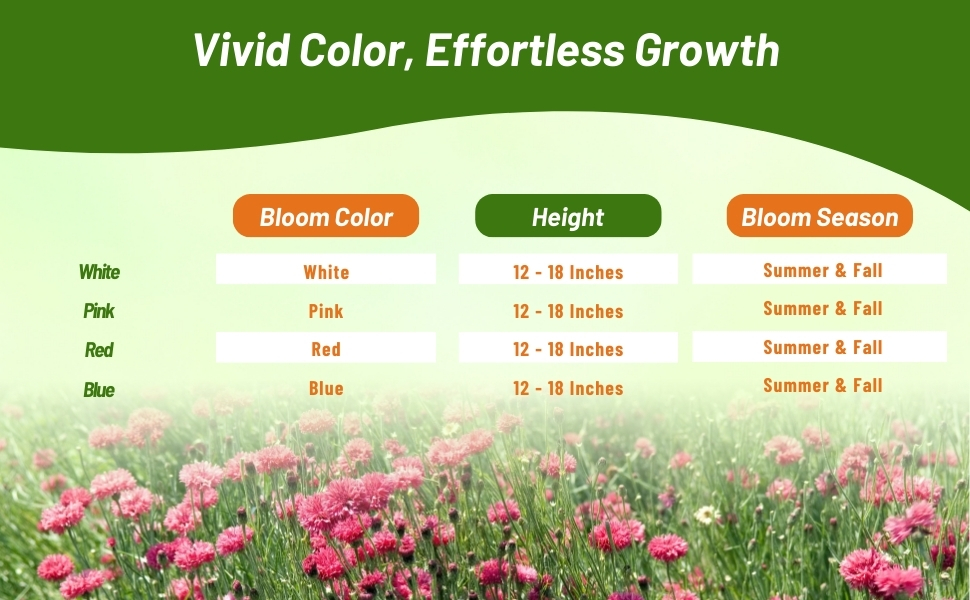

Cornflower (Centaurea Cyanus Dwarf Tom Pouce White) - No matter what your xeriscape landscape is like, a formal flower garden or smaller borders with wildflowers, these dwarf Cornflowers, with their pure white blooms, will add a charming presence. Also known as Bachelor's Buttons, the flower seed is easy to grow, and it quickly provides blooms that are excellent for cutting and drying as well.
Planting Directions
TEMPERATURE
65F
AVERAGE GERM TIME
14 - 28 days
LIGHT REQUIRED
No
DEPTH
1/4 inch
SOWING RATE
10 - 12 seeds per plant or 6 seeds per foot
MOISTURE
Keep seeds moist until germination
PLANT SPACING
6 - 12 inches





Cornflower (Centaurea Cyanus Polka Dot Mix) - These easy to grow flower seeds are great for beginning gardeners or children's gardens. The Centaurea Cyanus flower seeds are larger making them easy to handle, and they germinate readily to create this fun Polka Dot mix of colors. The colors in this mix include: white, blue, rose and lavender. Plan on a mass planting for wonderful display of color! Cornflowers, or also commonly called Bachelor's Buttons, are wonderful cut flowers as well. The blooms dry nicely for dried everlasting arrangements. These wildflowers are a very rewarding flower to grow from flower seed!
Like many wildflowers, the plants prefer full sun in mild climates and partial shade in the hottest regions. They tolerate a wide variety of soil as long as it drains well. Cornflowers perform the best in mild climates with moderate water, but they can withstand drought. A perfect plant for xeriscape landscaping where little to no water usage is required. Bachelor's Button flowers are very attractive to both bees and butterflies, but deer leave the plants alone. Cornflowers are annuals, but they can self-sow, dropping their own flower seeds to provide next year's display.
Directly sow seeds outdoors in early spring as soon as soil can be worked. Prepare seedbed by loosening soil and weeding. Sow the flower seed in rows, 6 seeds per foot. Thin small seedlings to 6 - 12 inches apart. In mild winter climates, sow the seed in the fall for very early blooms the following spring. The first blooms appear 10 - 12 weeks after planting, and last for about a month. Successive plantings can extend the bloom period.
Common Questions
Where should I plant cornflower?
Enhance your ornamental vegetable garden by incorporating the versatile cornflower. Its nectar content attracts pollinators, benefiting the yield of tomatoes, squash, and other dependent plants. In a wildflower garden, plant cornflower to attract bees and butterflies. Alternatively, in a cutting garden, pair blue cornflower with annuals such as orange cosmos or yellow marigolds. Grow cornflower alongside robust perennials like rudbeckia or coneflower to provide natural support for its stems.
Do I need to deadhead my cornflowers?
You can increase our bloom season if you deadhead your flowers. Deadheading however is not necessary.
How can I encourage more blooms?
Cornflowers thrive in bright and sunny environments, so it's crucial to plant them in a sunny location. If your cornflowers aren't blooming because of inadequate light, your best option is to plan ahead for the following year and sow them in a sunnier area.
How Long Does Cornflower Bloom?
Cornflowers usually flower for approximately 10 weeks, from May to mid-July. Extending the bloom time can be achieved by seeding the flower every two weeks on a staggered schedule.
Can I grow my cornflower in containers?
Yes, when cultivating cornflowers in pots or containers, it's important to maintain slightly dry soil to replicate pasture environments. Opt for porous clay or terracotta pots for best results. Select well-draining soil with perlite, or opt for a soilless mix composed of organic materials (similar to cactus potting soil). Regularly remove faded blooms from your potted cornflowers to keep them looking neat. Expect a brief flowering period when grown in this manner. Shorter varieties work best in containers.
Planting Directions
TEMPERATURE
65F
AVERAGE GERM TIME
14 - 21 days
LIGHT REQUIRED
No
DEPTH
1/4 inch
SOWING RATE
10 - 12 seeds per plant or 6 seeds per foot
MOISTURE
Keep seeds moist until germination
PLANT SPACING
6 - 12 inches





Cornflower (Centaurea Cyanus Tall Double Ball Black) - Easy-to-grow from seeds, this tall annual makes a great addition to the summer border. The color is a deep, rich claret which is as close to black as possible. Centaurea Cyanus Black Ball certainly adds drama! Cornflowers are especially nice in traditional cottage gardens, and they make an excellent cut flower. Also known as Bachelor's Button Black Ball, these flowers are native to much of the United States.
Bachelor's Button plants prefer full sun in mild climates and partial shade in the hottest regions. They tolerate a wide variety of soils as long as it drains well. Centaurea Cyanus performs the best in mild climates with moderate water, but the plants can tolerate drought. Cornflowers are very attractive to both bees and butterflies, but fortunately deer leave the plants alone.
Directly sow seeds outdoors in early spring as soon as soil can be worked. Prepare seedbed by loosening soil and weeding. Sow the flower seed in rows ensuring you sow at least 6 seeds per foot. Thin young plants to 6 - 12 inches apart. In mild winter climates, seed can be sown in the fall for very early blooms the following spring. Cornflowers will drop their mature seeds and often self-sow providing climate conditions work out.
Common Questions
Where should I plant cornflower?
Enhance your ornamental vegetable garden by incorporating the versatile cornflower. Its nectar content attracts pollinators, benefiting the yield of tomatoes, squash, and other dependent plants. In a wildflower garden, plant cornflower to attract bees and butterflies. Alternatively, in a cutting garden, pair blue cornflower with annuals such as orange cosmos or yellow marigolds. Grow cornflower alongside robust perennials like rudbeckia or coneflower to provide natural support for its stems.
Do I need to deadhead my cornflowers?
You can increase our bloom season if you deadhead your flowers. Deadheading however is not necessary.
How can I encourage more blooms?
Cornflowers thrive in bright and sunny environments, so it's crucial to plant them in a sunny location. If your cornflowers aren't blooming because of inadequate light, your best option is to plan ahead for the following year and sow them in a sunnier area.
How Long Does Cornflower Bloom?
Cornflowers usually flower for approximately 10 weeks, from May to mid-July. Extending the bloom time can be achieved by seeding the flower every two weeks on a staggered schedule.
Can I grow my cornflower in containers?
Yes, when cultivating cornflowers in pots or containers, it's important to maintain slightly dry soil to replicate pasture environments. Opt for porous clay or terracotta pots for best results. Select well-draining soil with perlite, or opt for a soilless mix composed of organic materials (similar to cactus potting soil). Regularly remove faded blooms from your potted cornflowers to keep them looking neat. Expect a brief flowering period when grown in this manner. Shorter varieties work best in containers.































